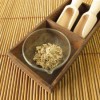By Dr. Edward F. Group III, DC, ND, DACBN, DCBCN, DABFM
Ever find yourself unable to remember what you did just two minutes ago? Or maybe you experience brain fog more often than you’d like. These days it seems to happen more frequently to all of us. Information overload, stress, and even the assortment of environmental toxins which assault us on a daily basis can impact brain function. While I recommend diet, exercise, and reducing electronic activity as the best ways to get the brain back to working order, sometimes we need a little help to restore mental balance. The following nine herbs have a traditional history of promoting mental health.
1. Mulungu Bark
The indigenous people of South and Central America have used mulungu for centuries to calm nerves, improve mood, and aid sleep. Erythravine, one of mulungu’s active alkaloids, may also help reduce anxiety and protect brain function. Flavonoids present in this herb are known antioxidants and have been shown to support cardiovascular health and a healthier brain.
2. Bacopa
Commonly known as Brahmi, Ayurvedic medicine uses bacopa to improve memory, reduce stress, and support cognitive function. Researchers observed cortisol — the body’s stress hormone– decreased in study participants who took bacopa compared with those taking a placebo. Additional research indicates it may support the physical health of brain cells and offer some protection against brain aging and age-related diseases such as Alzheimer’s disease.
3. Mucuna pruriens
Mucuna contains L. dopa, a biochemical precursor to several neurotransmitters. One of those neurotransmitters is dopamine, and increasing dopamine levels may improve brain function and support memory. This effect probably contributes to Mucuna’s popularity as an anti-aging herb. Antioxidant properties linked to Mucuna also discourage inflammation and suggest protective effects for neurons.
4. Rhodiola Rosea
This traditional medicinal herb contains two powerful natural compounds that have been proven to play a role in brain health. Salidroside is one of these compounds and is known as a potent antioxidant. Rosin is the other, and this compound appears to reduce inflammation of neural cells, possibly protecting against neurotoxicity. The results of one Swedish study showed that both of these compounds reduced fatigue, improved mood, and lowered stress hormones. This may lead to better mental performance and a more positive response to stress and anxiety.
5. Zizyphus jujuba
Also known as “sour date,” Zizyphus jujuba is one of the many herbs that may support mental health while encouraging a good night’s rest. Day-to-day activities can be draining on energy levels, not to mention mental strength. The plant’s saponins have demonstrated sedative effects on animal models, possibly supporting relaxation.
6. Passiflora incarnata (passionflower)
This traditional herbal sedative has been used as a sleep aid for years. Passionflower also appears to help relieve anxiety, a major cause of sleep disturbance for many individuals. Without a good night’s sleep, mental acuity becomes compromised and memory also degrades. Initial studies indicate consuming low doses of passionflower in a tea helps healthy adults achieve better sleep.
7. Scutellaria lateriflora (skullcap)
Native to North America, this plant has a history of use for calming nerves, easing stress, lifting the mood, and aiding sleep. Research suggests it possesses mood enhancing effects and its antioxidant properties may provide significant protection for the brain against the damaging effects of inflammation.
8. Kava
The clear oceans and sandy beaches of the South Pacific may be ideal for reducing stress and promoting relaxation. For those of us unable to get there at the moment, kava may offer a positive alternative. Used traditionally to relieve stress, anxiety, and insomnia, kava contains compounds known as kavalactones. These compounds offer non-opiate and non-narcotic alternatives against anxiety. Some studies indicate kavalactones perform as well as certain pharmaceutical drugs.
9. Saffron
Saffron, also known as Crocus sativus, does more than add color and flavor to food. It has a long history of use for mood disorders, stress, and anxiety. Studies have also found it as effective as antidepressants for lifting mood and relieving anxiety, significantly outperforming placebo in clinical trials.]
Further Approaches to Brain Health
Herbs aren’t the only way to keep the brain sharp and running smoothly. Two naturally-occurring minerals do wonders for memory, focus, and overall health. These minerals are:
Lithium Orotate
This mineral protects the brain from the damaging effects of environmental toxins. In doing so, lithium may offer anti-aging benefits, and studies have shown it to increase grey matter in the brain. It also supports a positive mood and positive responses to stress and anxiety. Unlike other lithium drug forms, lithium orotate easily passes through cell walls for greater bioavailablity to mitochondria, glia, and lysosomes. This means smaller doses work better, making it safe and thereby reducing the chance of side effects.
Zinc Orotate
Dr. Hans Nieper discovered zinc orotate was more easily assimilated by the human body. This neutrally-charged form of zinc crosses cell membranes, getting where it’s needed most to support hormone production and balance, metabolism, tissue growth, and nerve function.
A Final Thought
You can easily find many of these herbs and minerals in individual preparations, although formulations which combine extracts of these plant materials increase the overall effect on mood and mental health. The reason is simple: the human body isn’t a simple machine with an easy solution for problems, especially those involving mood and mental health. Rest, sleep, and exercise remain the best place to start for reducing feelings of fatigue and mental cloudiness. Sometimes the body needs help to restore balance and find shelter from environmental toxins.
http://www.globalhealingcenter.com/natural-health/top-9-herbs-mental-health/

